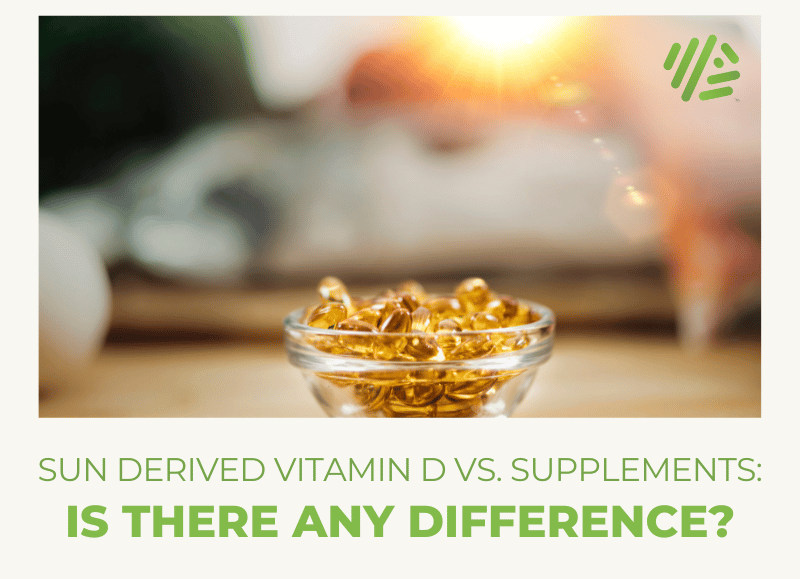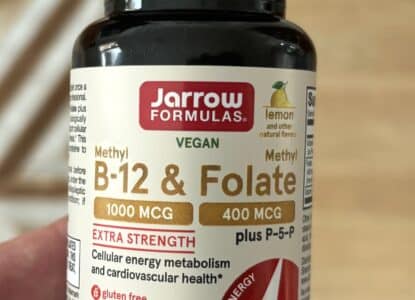Sun Derived Vitamin D vs. Supplements: Is There any Difference?

Many of us are interested in the crucial role vitamin D plays in strengthening the immune system. We want to make sure we are getting the Vitamin D we need.
What is the best way to do this?
Should we grab a beach towel and lay out in the sun, or is a supplement better?
Let’s dive in.
Vitamin D basics
The body needs vitamin D. It’s a fat soluble vitamin that helps us absorb calcium from the intestines. The body’s ability to utilize calcium from vitamin D plays a big role in bone density and bone health, which we covered previously in this post.
There are two types of vitamin D we can take in supplemental form – vitamin D2 and vitamin D3. D2 is derived from plants and is vegan friendly, whereas vitamin D3 supplements are usually animal derived.
Both D2 and D3 “work” as supplements because both forms of vitamin D help the body make calcitrol, the bioactive form of vitamin D produced when UVB light hits the skin and interacts with cholesterol. 1
The foods we eat contain some vitamin D, but often not enough for many Americans to avoid vitamin D deficiency, which is estimated to occur in 41% of the population and is thought to be particularly acute in African American populations. 2
Sun derived vitamin D vs. supplements
According to Yale Medicine, vitamin D derived from sunlight is no better than the Vitamin D we get from supplements. They are functionally the same and can both boost vitamin D levels to a healthy range.
The body can use supplemental and sunlight derived vitamin D in exactly the same way. The benefit of supplements is that they reduce the risk of skin cancer from an excess of sun exposure. Not all of us have the complexion for sustained time outdoors.
However, the fact remains that under “natural” circumstances, vitamin D is mainly obtained through exposure to sunlight, where it is generated by the cells of the skin.
This study, which was published in the Journal of Clinical Investigation in 1993, looked at the impact of vitamin D levels from UVB light exposure vs. vitamin D2 supplements.
The study is small, so we can’t draw too many conclusions, but there is evidence indicating that the vitamin D we get from sunlight stays active in the body longer than the vitamin D we get from supplement form.
The authors studied vitamin D transport from the skin in 7 healthy volunteers. Effectively, subjects were placed in tanning beds with strong UVB light. Blood samples were then taken after exposure. In the subjects placed in tanning beds, vitamin D had gone up 10 hours after their session, and it peaked 24 hours later. The vitamin d levels in the tanning bed subjects stayed high for 7 days.
Note: tanning beds increase risk for skin cancer, they are not the best way to get vitamin D and should be avoided.
3 volunteers who ingested a 1.25 mg dose of vitamin D2 (a normal dose, not a mega-dose) also saw an immediate increase in vitamin D levels. The increase in vitamin D was much higher in the supplement group, but the levels of vitamin D didn’t stay high in their plasma for nearly as long as the simulated sunlight group.
Why?
The liver releases vitamin D from sunlight on different proteins than supplemental vitamin D. Supplemental vitamin D gets carried on little “fat taxis” known as chylomicrons and lipoproteins, by contrast, sun derived vitamin D travels more slowly via a special carrier protein called vitamin D binding protein (DBP).
- Supplement vitamin D – carried on lipoproteins – fast acting but quickly cleared.
- Sun synthesized vitamin D – carried almost exclusively on DBP – slow but sustained increase and release.
It was assumed that dietary or supplementary vitamin D was carried in the same fashion, via the DBP protein. However, new research has shown ingested vitamin D in supplement form is preferentially carried by various chylomicrons and lipoproteins, allowing it to pass from the stomach into the blood supply quickly. 3 4
Interestingly, it seems that when vitamin D binds with lipoproteins it is much more readily used, whereas when associated primarily with DBP it demonstrates a much longer lasting effect. 1
So, for our purposes here, we see that vitamin D derived from sun exposure causes a smaller spike, but lasts longer in our systems than does supplemental vitamin D. By contrast, supplemental vitamin D offers a more immediate boost, but its association with lipoproteins rather than DBP causes the body to clear it faster.
Key takeaways
The vitamin D we receive from supplements is no different than the vitamin D our skin makes when exposed to sunlight, however, the source of vitamin D can affect how long the vitamin D stays active in our systems.
Those supplementing with vitamin D may be better off with consistent small daily doses so as to keep levels in a healthy range.



